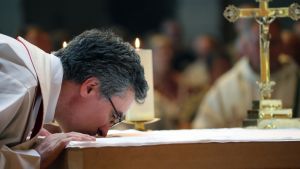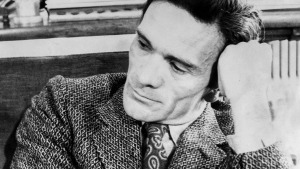What do the anticlerical screenwriter Pasolini and Pope Paul VI have in common? The same passion for Christ and the same revolt against the bourgeois mores of materialistic society. The publisher Michel Cool sees in them a common spiritual resistance to the chaos of the world.
This year marks the centenary of Pier Paolo Pasolini (1922-1975). In Italy, he is considered to be one of the greatest intellectuals and artists of the 20th century. A man-orchestra of Italian culture, Pasolini was at the same time a writer, a poet, a journalist, a screenwriter and an abounding, provocative and even sulphurous director. There was Caravaggio in his house. Common features linked these two talents so entire: one in his paintings and the other in his films and his poems knew how to bring light to the sometimes most sordid obscurities of the human condition. Both also led lives on the margins of the norms and stereotypes of their time: Caravaggio was called depraved, a brawler and an assassin; Pasolini asserted his homosexuality and campaigned for the right to be different. Both experienced mysterious and atrocious deaths: the corpse of the painter was found abandoned in a cemetery and that, massacred, of the filmmaker on the beach at Ostia.
The temptation of holiness
On December 4, a symposium on ” The Christ figure in Pier Paolo Pasolini » takes place in the Cathedral of Saints-Michel-et-Gudule in Brussels. What the hell does Pasolini get into a cathedral! His cinematographic masterpiece is nevertheless inspired by Christ: The Gospel According to Saint Matthew, released on the screens in 1964, was nominated three times for the Oscars. It has become a cult film. Willingly provocative, Pasolini, a notorious communist and anticlerical, had dedicated it to Pope John XXIII.
René de Ceccaty, his best specialist in France, sees in this film a self-portrait: “When he did in The Gospel According to Saint Matthew the portrait of Christ, he wanted to describe a rebellious man, concerned with justice and truth, as a double of his own personality. This childhood fascination has never waned. “I had the temptation of holiness. It was poetry,” Pasolini confided. Throughout his commitments against fascism, then against the “system” represented in his eyes by Christian Democracy and the Communist Party from which he ended up separating, the figure of Christ remained for him a source of inspiration and critical radicalism. in the face of a society that prefers to alienate the Word of God rather than the sirens of consumerism and hedonism at all costs.
Pasolini was a sharp observer of the transformations of Italian society from the post-war period until the mid-1970s. He raised lively polemics and provoked debates because of his very critical ideas towards bourgeois mores and the nascent consumerist society, but also vis-à-vis the protest movements of 1968 and its protagonists: he found them “next to the plaque “. He even felt that their societal liberalism played into the hands of consumerist ideology, which would make short work of it.
Spiritual Resistance
His articles published in the Italian press have been collected and translated into French in a volume entitled Corsair writings. One of his writings is quite breathtaking. Pasolini emphasizes the historical character of a speech by Paul VI, which then went completely unnoticed. It was September 11, 1974 in Castel Gandolfo. Pasolini notes that “the deeply impulsive and sincere Pope that is Paul VI explicitly admitted that the Church has been defeated by the world; that its role has suddenly become uncertain and superfluous; that the real power no longer needs her and therefore leaves her to herself, […] that the problem of the “poor” no longer exists, that is to say the most important problem for the Church, etc”.
Pasolini does not make fun of this recourse to interior conversion. Isn’t it a form of non-violent revolution that makes him dream?
Thanks to Pasolini, I discovered this astonishing speech of September 11, 1974. I felt a thrill of emotion while reading it. Indeed, a pope daring to free himself from any compromise with ecclesial doxa and also with the folklorization of religion expected by society, notes in a few simple and clear words, the end of life of a style of Church. His flaw? To have compromised too much or not opposed enough to the takeover effected on the world and on people’s minds by furiously materialistic and commercial “values”. What to do ? To have confidence and to pray, this pope, an expert in crises, replies without further ado. Pasolini does not make fun of this recourse to interior conversion.
Pasolini was not from the Catholic seraglio, far from it. Paul VI was a fruit of it. But both have been prophetic whistleblowers for the Church.
Isn’t it a form of non-violent revolution that makes him dream? The Italian poet also sees in this confession a pledge of the sincerity and spiritual resistance of this pope so misunderstood and so abandoned by his own and by the world. Perhaps precisely because he was able to see from afar, and before so many people, the great flashes that now streak the horizon of the Church. Pasolini was not from the Catholic seraglio, far from it. Paul VI was a fruit of it. But both have been prophetic whistleblowers for the Church. Their parallel stowage to the figure of Christ, not necessarily identical, was however their shared base. And perhaps also the stimulus of their extraordinary spiritual resistance in the chaos of the world.
Learn more:

Pier Paolo Pasolini and Paul VI, two unexpected whistleblowers

